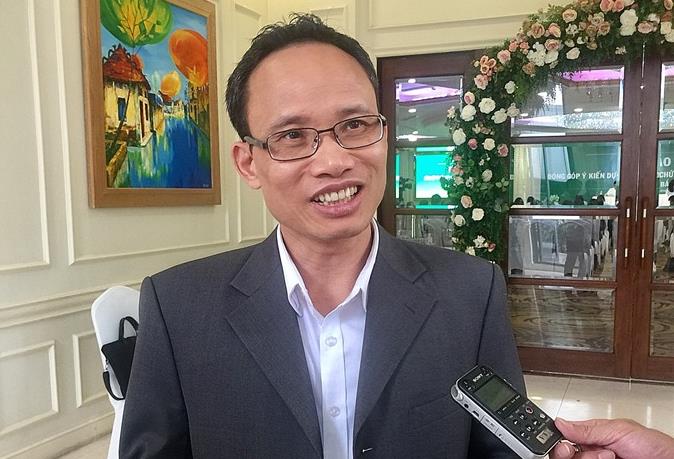Can Van Luc, chief economist of the Bank for Investment and Development of Viet Nam, a member of the National Financial and Monetary Advisory Council, speaks to Viet Nam News reporter Nguyen Linh Anh about the his concerns over the revised draft law on securities, released recently for public comments and consultation from ministries and market players.

Can Van Luc, chief economist of the Bank for Investment and Development of Viet Nam, a member of the National Financial and Monetary Advisory Council, speaks to Viet Nam News reporter Nguyen Linh Anh about the his concerns over the revised draft Law on Securities, released recently for public comments and consultation from ministries and market players.
Under the revised draft Law on Securities, the foreign ownership ratio in a public company is expanded up to 100 per cent. Previous regulations had capped foreign ownership at 49 per cent. However, this ratio in commercial banks, which is a much-concerned issue recently, was not mentioned in the draft. Why?
The draft has removed limits on how many voting shares foreign investors can buy in public Vietnamese companies. This indicates that the Government has sped up the equitisation process in State-owned enterprises, especially in non-essential sectors that are not too sensitive to the economy. However, under the draft, some conditional business lines, such as commercial banks, would retain their existing 30 per cent limit. I agree with this provision of the drafting agency.
In South Korea, Thailand, the market regulators are quite open with this issue when loosing foreign room in banks. However, in Viet Nam, the banking industry is a relatively sensitive sector, playing an essential role in the economy, channeling capital into the economy. In terms of assets, banks account for 68 per cent of the financial system’s total assets.
As far as I know, few investors have sought PM’s approval to increase the foreign ownership ratio at banks to more than 30 per cent. This proves that the current room for foreign investors in banks seems not to be used up yet at the moment so it is not necessary to send petition to the Government to increase foreign ownership in banks exceeding 30 per cent.
In the long term, the State may need to continue to consider raising this ratio at banks in the context that Viet Nam is increasingly joining new-generation free trade agreements (FTAs) like CPTPP and EVFTA.
Do you have any other suggestions to the draft’s revision in the context of Viet Nam’s deeper international integration?
When Viet Nam is engaging deeper in FTAs, which require much more transparency, openness and consistency in the law system, the draft needs to consider more thoroughly the stock market restructuring process, including the restructure of the two exchanges, markets and securities companies.
It also needs to define new concepts that are emerging in the market such as blockchain, digital securities trading, securities lending, crowd funding, data sharing, real estate investment trust funds and peer-to-peer lending.
It is argued that the new draft law is hindering businesses from accessing capital mobilised through the stock market channel as it adds more conditions related to initial public offering of shares and the issuance of bonds. Could you comment?
Yes, I agree with this opinion on some points.
Regarding the conditions for the initial public offering (IPO) of shares, the draft requires that the issuing organisations must have the paid-up charter capital of at least VND30 billion (US$1.28 million) at the time of registration. This amount is much higher than the previous required amount of VND10 billion as stipulated in the current law.
Issuing organisations must also be profitable in the two nearest consecutive years before the registration year of the offer, instead of one year as said in the current law. However, there are many start-up businesses with huge potential but lack of resources and wish to raise capital from IPO. They can not be profitable right within the first two or three years of establishment.
When a public company issues corporate bonds, it must have minimum charter capital of VND300 billion, which is a high level. Recent corporate capital survey shows the group of enterprises with charter capital of more than VND500 billion accounts for only 1 per cent, those has capital from VND200 to VND500 billion accounts for only 2 per cent, the rest 97 per cent are small- and medium-sized enterprises with capital of less than VND200 billion.
I think the draft agencies and market regulators should reconsider these improper regulations as they could deter firms from accessing capital mobilised from the stock market.
The new draft empowers the State Securities Committee (SSC) to engage in the inspection and handling of violations on the stock market. To what extent do you agree or disagree?
It is feasible and appropriate to give the investigation authority to the SSC.
This move aims to create a complete regulatory system on governance to supervise, inspect and handle violations in order to meet development and management requirements of the securities market, reduce risks to the market and limit violations of law.
SSC will deploy regular inspection missions of public companies, securities companies, fund management companies and auditing companies. The agency will also continue to monitor emerging market issues, abnormalities in its operations and specialised inspections to co-ordinate with competent agencies in handling law violations.
Regarding the handling of violations, the SSC will focus on dealing with emerging issues, cases of signs of manipulation, internal transactions, signs of criminal violation to create deterrence, protection of investors’ rights and interests. — VNS





